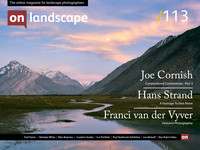Nicholas White talks about one of his favourite images

Nicholas White
Nicholas White is a photographer based on the edge of Dartmoor National Park in the South West of England. He graduated from Plymouth College of Art in 2013, was commended in Landscape Photographer of the Year 2015 and is an Associate of the Royal Photographic Society. He currently divides his time between a studio with no windows, and the landscapes of the British Isles. Nick's other website is http://www.blackdotsproject.co.uk/, Facebook, Twitter and Instagram.
Sitting down to write about my favourite photograph and I am instantly confronted by my first hurdle: I don’t actually have one. I don’t even have a top five. I’m reassured to discover that many of the previous contributors to End Frame have also struggled, but this got me thinking: why don’t I have a list of favourite images? Having gone through five years of photographic education, I’ve quite possibly emerged from the other side a slightly more confused version of my former self. From the moment I began taking pictures, photography equaled landscapes but Arts College opened my eyes to just how vast the photographic world was.
Despite landscape remaining my passion, I was introduced to multiple areas of this medium. I’ve gazed at thousands of images and whether I’ve loved them or hated them, they’ve all influenced my practice in some way shape or form. Learning what I don’t like has been equally important to me as pinpointing exactly what I do like. It was during my time at university that I fell in love with traditional reportage war photography. I grew an admiration of these image makers and the risks they took to bring a story home. The raw, gritty aesthetic and the sheer intensity – I’d never seen anything quite like it. This interest in conflict photography ran parallel with my love for landscape and at some point, probably over a low-grade cappuccino in the university canteen, these converged. This was a pivotal moment for me as a photographer as I began to realise that photographers were using the landscape as a narrator, to aid in the communication of a much larger, more complex narrative. One such photographer is Richard Mosse, and it is one of his images that I have chosen to write about.

